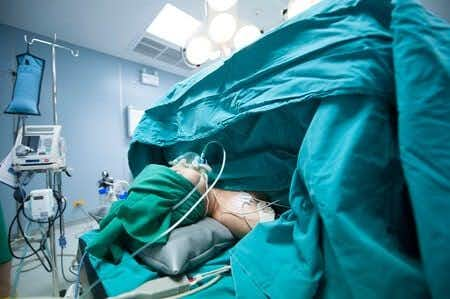The patient underwent a difficult primary low segment C-section, during which the surgeon noted the uterus was scarred and sclerosed. On the first day after her surgery, the patient’s white blood cell count was noted to be 3.2 with a left shift. Her urinary output was low and she had periods of hypotension.
The next day, the patient had increasing abdominal pain and progressively lower blood pressure. Her abdomen was noted to be markedly distended but there was no focal tenderness. The patient then began breathing rapidly. The attending surgeon admitted the patient to the ICU for concern of systemic inflammatory response syndrome. An IV bolus was given and her lactate was elevated. A general surgeon was consulted and noted an acute abdomen. The patient went for an exploratory laparotomy which revealed a 3 cm hole in the distal ileum and 2 liters of fecal material in the patient’s peritoneal cavity. A portion of the bowel was resected and a primary anastomosis was performed. The patient was admitted to the ICU for several weeks and underwent 2 additional washouts and wound closures. The patient required intense rehabilitation to recover from her condition.
Question(s) For Expert Witness
1. What is your experience treating patients like the one described in this case?
2. What are some of the signs of a perforation following a C-section?
3. What is the post-operative workup for a patient with abdominal pain, vitals, and labs like those in this case?
Expert Witness Response E-000171
Bowel injury is rare during cesarean section, but not unheard of. The scarring and sclerosis are risks for injury to adjacent structures. I have encountered many patients with adhesions and scarring at cesarean, and a patient with post-cesarean bowel injury perhaps twice in my career. Signs of perforation are variable but include ileus with distension and bowel obstruction, fever, elevated WBC, pain, and other local and systemic signs. With the possibility of a bowel injury, I would get imaging studies and a consult from general surgery. A bowel injury at the time of cesarean is not in itself evidence of malpractice or performance below the standard of care. Bowel injuries have been reported and can occur even in the best of hands.
This patient clearly had risk factors for bowel injury, which should have been taken into account during the post-operative events. The OBGYN's index of suspicion should have been high. The patient was going downhill and probably should have been evaluated by a surgeon a day sooner than she was. Malpractice often occurs during the post-operative period. This can include the surgeon's failure to realize something is going wrong, and/or their failure to react to the patient's condition appropriately, including providing appropriate consultation. I am not clear in my own mind that malpractice occurred here. The response may have been a day late, but was appropriate (consultation and surgery). The problem for the plaintiff's case is: did the delay make any difference? Certainly one can argue that a day sooner would have mitigated how sick she was, and helped with her recovery, but there was still fecal material in the abdomen, and she still needed the second surgery and got away without an ostomy. I am not sure what her incremental morbidity was as a result of any delay.
About the author
Wendy Ketner, M.D.
Dr. Wendy Ketner is a distinguished medical professional with a comprehensive background in surgery and medical research. Currently serving as the Senior Vice President of Medical Affairs at the Expert Institute, she plays a pivotal role in overseeing the organization's most important client relationships. Dr. Ketner's extensive surgical training was completed at Mount Sinai Beth Israel, where she gained hands-on experience in various general surgery procedures, including hernia repairs, cholecystectomies, appendectomies, mastectomies for breast cancer, breast reconstruction, surgical oncology, vascular surgery, and colorectal surgery. She also provided care in the surgical intensive care unit.
Her research interests have focused on post-mastectomy reconstruction and the surgical treatment of gastric cancer, including co-authoring a textbook chapter on the subject. Additionally, she has contributed to research on the percutaneous delivery of stem cells following myocardial infarction.
Dr. Ketner's educational background includes a Bachelor's degree from Yale University in Latin American Studies and a Doctor of Medicine (M.D.) from SUNY Downstate College of Medicine. Moreover, she is a member of the Board of Advisors for Opollo Technologies, a fintech healthcare AI company, contributing her medical expertise to enhance healthcare technology solutions. Her role at Expert Institute involves leveraging her medical knowledge to provide insights into legal cases, underscoring her unique blend of medical and legal acumen.



